"I suppose musicians these days are trying to create music that tells their own personal stories, whether that’s their heritage or their parents’ heritage, music that reflects the political scene of the moment. I think people are becoming more personal," says Yazz Ahmed. The British-Bahraini bandleader, trumpeter, and composer has created a unique space for herself in the UK jazz scene by freely drawing upon jazz, Arabic music, and electronic music in her writing.
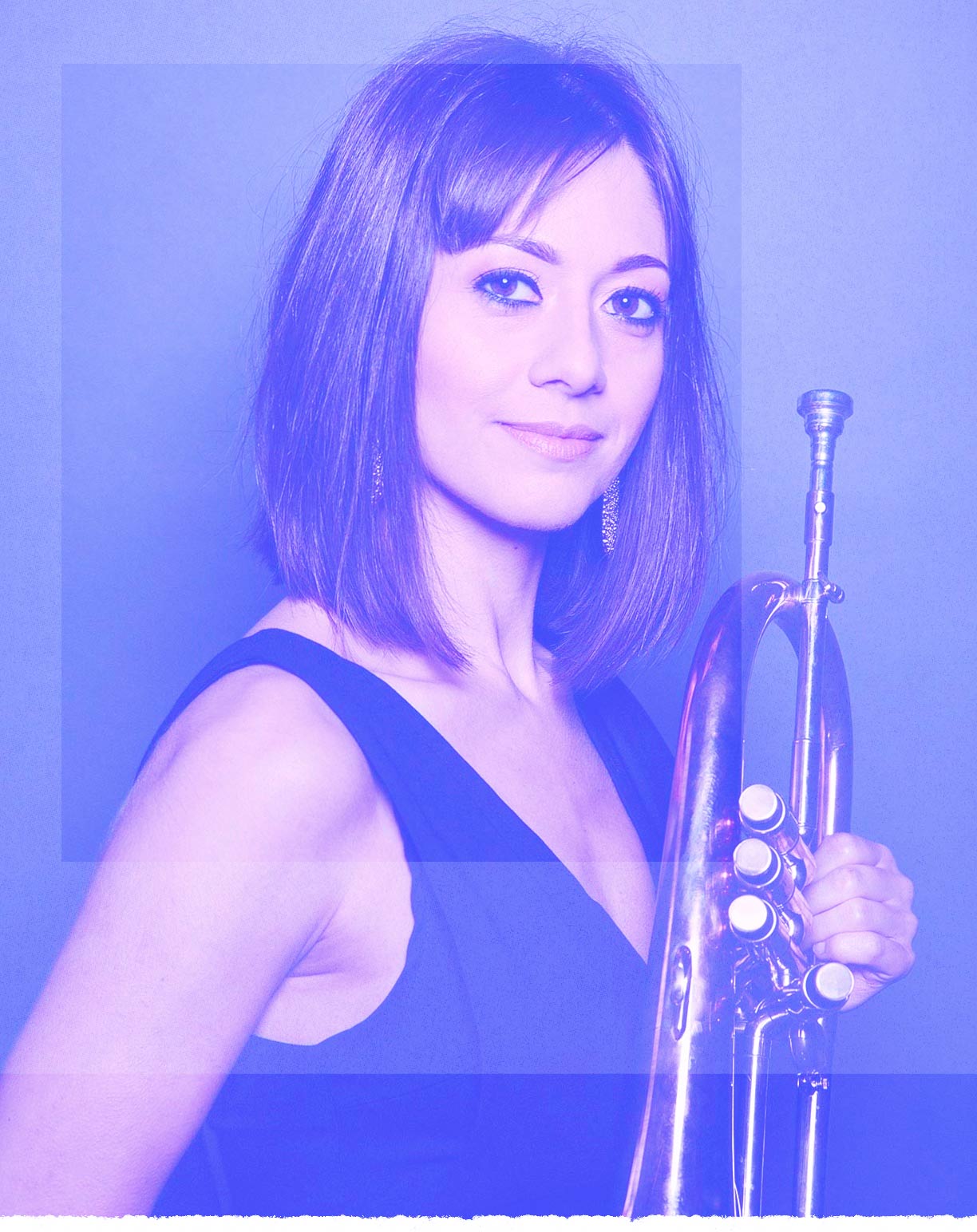
Her 2011 debut, Finding My Way Home, explores her dual heritage, raised in Bahrain until the age of nine before she moved to London with her mother. La Saboteus, in 2017, addresses her struggles with her self-doubt, while 2019’s Polyhymnia was originally commissioned to be performed by the Nu Civilisation Orchestra at the WOW! Festival on International Women’s Day in March 2015.
Named after the Muse of sacred poetry, dance and eloquence, Polyhymnia features six suites dedicated to inspiring women—the Saudi Arabian filmmaker Haifaa Al Mansour, British saxophonist Barbara Thompson, The Suffragettes, and the activists Ruby Bridges, Rosa Parks, and Malala Yousafzai. The album of the same name boasts an incredible cast of musicians drawn from the UK jazz scene including Tori Freestone, Camilla George, Nubya Garcia, Sophie Alloway, and Shirley Tetteh.
Outside of leading her own projects including the Hafla Band and Electric Dreams, Ahmed has played with the Electric Lady Big Band, recorded and performed with Radiohead for their 2011 album, The King Of Limbs, and worked with the experimental electronic group These New Puritans. Faced with lockdown, Ahmed has stayed busy with new commissions and recordings, including works for the Adult Swim channel and the Festival of New Trumpet Music. And there’s a Polyhymnia remix album in the works.
"I’ve got three guest electronic artists, DJ Plead from Australia, but he’s also part-Lebanese and part-Swiss, there’s a DJ called Asmara from LA, and the other one is a guy called Surly who’s from New Zealand, so it’s quite an international project," she says. "Four tracks, three remixes and I’ve done one with my partner [trumpeter Noel Langley] as well. So that’s really exciting."
How does commissioning work for projects like Polyhymnia? Do people seek you out?
People usually contact me. I suppose one thing leads to another. Polyhymnia was my first commission from the Tomorrow’s Warriors. They’re an organisation who nurture and help musicians from ethnic minorities and women, so they had faith in me. They wanted to give me a chance to write a piece of music for a large ensemble.
Since then, I’ve had commissions come in because it was a successful project, one thing had led to the other. People have heard my albums and that’s also inspired people to ask me to write music for whatever project it is. I suppose there were two times when I did write to people to be a part of a programme. I applied to LSO Soundhub, who have an educational scheme to help young, emerging composers, so I applied for that and then I got to write for some of the LSO musicians.
When you get a commission, are you given much direction?
A lot of the time it seems to be quite open but there are themes. When I wrote for the Ligeti Quartet, that was part of a celebration of Holst’s The Planets, so we had to write for the quartet but also have a planet in mind. I wrote about Saturn, so I was inspired by the images I saw and facts about the planet.
The same with the Moon piece that I wrote [commissioned by the Open University and performed at the OU Moon Night in December 2018], there were some ideas from the scientist I was working with about the discovery of water on the Moon and what it might be like living on the Moon in the future. And then a lot of the other commissions, like the last two, have been totally free. They’ve just said write whatever you want for whoever you want.
Your early musical education was in classical music, did that help with the LSO and Holst?
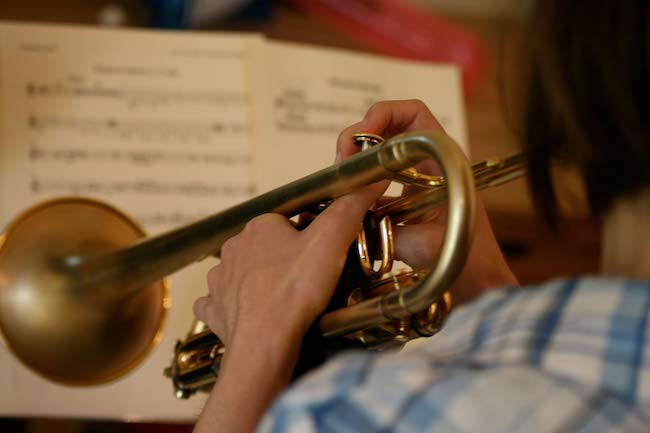
Do you know what, I’m not sure really, to be honest. I suppose so. I’ve been exposed to loads of different types of music. Back when I did try to write this piece, Saturn, for The Planets project, my first ideas were to write something classical and I really struggled with that because I wasn’t writing with my true voice.
I hit a brick wall. I couldn’t write creatively, I was thinking too much, using my brain too much, and the music didn’t sound so good. I had to change my approach and write from my heart, being true to myself rather than trying to write in a certain way. Having that classical experience, it does help in some ways, but I like to forget about it and just write in my own way.
You first performed Polyhymnia in 2015, and the album came out in 2019, what changed the most from conception to the finished release?
During that time, I was also working on La Saboteuse, so I think that the experience of making that album and developing my music really fed into Polyhymnia. It was a piece I always wanted to record from the very first performance because the experience was really uplifting, the audience really enjoyed it, and they got the message celebrating courageous and inspiring women. That spurred me on to apply for funding to pay the musicians to record it. The way my playing and my writing developed during the time it was written and the first recording sessions was quite a contrast and that helped the music to develop and evolve. I’m quite glad I left that gap.
You assembled a remarkable line-up of musicians. Could you have everyone in the same place at the same time?
Unfortunately, no. The rhythm section parts you hear, most of them are live, played together in the studio, and some of the brass parts were as well, as well as the improvised solos. As my ideas changed, I wanted to add more players onto the pieces, I wanted to change some of the melodies a little, so we had to do some recording at home, so I invited some of the musicians to come over to my place and record one-by-one. Some people recorded at their places, so it was a mixture of live studio stuff and recording individually, a mish-mash, but I think the results are really pleasing, to me anyway.
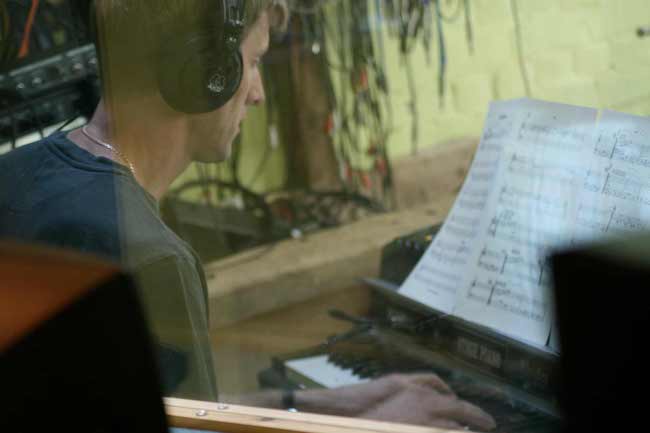
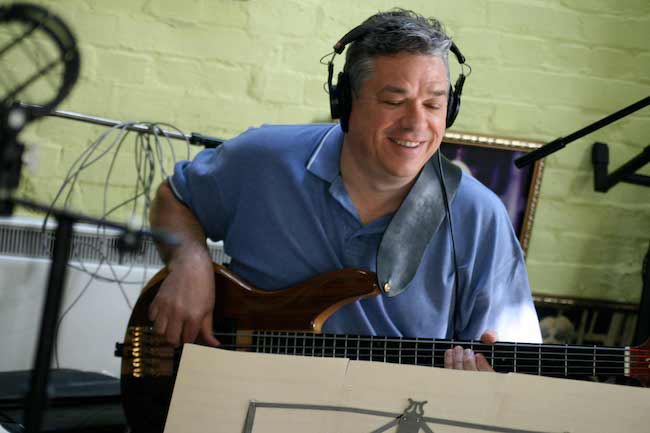
How long did it all take?
A long time! It was interrupted with touring and other projects. The first recording sessions were in 2016 and the very last one was in March 2019. It’s the way it developed. I like to add a lot of layers and I like to think really carefully about what I’m going to release. It’s nice to make an album in a week, that’s really fantastic, but I like to let the music simmer for a while and come back to it with fresh ears. I like to take my time, I think it’s important for the music to breathe.
You have a custom-made flugelhorn that allows you to play quarter tones. Was it challenging to bring that Arabic musical language into a jazz setting?
It wasn’t easy, to be honest. Firstly, I had to readjust my ears to hear these blue notes in Arabic music, the emotional notes. I had to change my way of listening and tuning on the instrument. On brass instruments, if you play an out of tune note, you automatically adjust your embrasure to tune it up or down, but I couldn’t do this on the instrument, so I had to blow through and let the note sing, which was quite a new concept for me—playing what we might think of as out of tune notes, quarter tone notes. You have to believe in those notes to play with a lovely sound.
Bringing those tones into jazz, I had to re-think how I write music. The pieces that I wrote specifically for the instrument, I left lots of open space so the quarter tones don’t clash with the instruments that can’t play quarter tones. A vibraphone can’t play quarter tones, you can’t bend the notes really. The same with piano, you can’t bend notes, so it was a challenge. I had to re-think and make the music more open to allow me to play these quarter tones without clashing with the other harmony instruments.
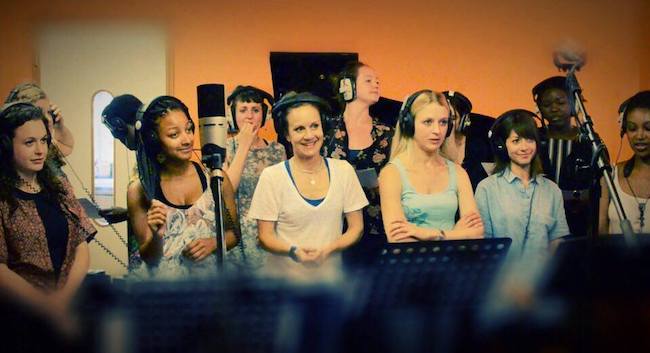
With three albums as a bandleader, what have you taken from this process?
I’ve definitely learned more about myself as a composer, my writing skills have developed, I’ve been learning more about Arabic music and the rhythms and scales that add that character to the music. The development has been quite a journey. I suppose my music is becoming more personal.
Even though Polyhymnia was quite outward looking, being inspired by the women I was writing about, and the previous two albums were inward looking, I think I’m finding my voice and becoming a stronger writer from these experiences. I’m in the middle of recording the next band album which will be music that is specifically inspired by my Bahraini heritage, and also there’s a remix project that’s going to be out very soon. That carries on from my interest in electronic music and collaborating with electronic artists. I’m always exploring and developing.
Have any of the women you wrote about on Polyhymnia heard the album?
Maybe Haifaa has. I did an interview on a film review podcast where they were talking about Haifaa Al Mansour’s latest film and to my surprise she was on the other line. I got to talk about her and they mentioned that I wrote music inspired by her, I don’t know if she’s heard it but she is aware at least.
I tried to write to one of the foundations that Ruby Bridges is associated with, I didn’t get any response back. I have some friends who know Malala personally, my friend’s daughter went to the same school. They want to try to get us to meet, which is really sweet, I’ve passed on my CD. Hopefully she’s heard it and has enjoyed the piece I wrote dedicated to her, but I don’t know.
La Saboteuse seems to be about grappling with your own negative inner voice?
It’s about my anti-muse. It’s that voice that stops us from achieving, the voice that says we’re no good, or we’re stupid, so it’s about embracing and battling those thoughts that keep us small. I think that voice wants to keep us safe because when we take risks there is the chance of failure and obviously failure is not a nice feeling. But if we want to achieve, we have to fail in order to achieve and improve.
That negative voice, La Saboteuse is the name I gave her which has been quite helpful in battling those feelings. I’ve been noticing when she is trying to stop me achieving, "Be quiet, I’m trying to write music here."
That seems very apposite for improvisational music, where you face the push and pull between the familiar and the unknown, muscle memory versus taking genuine risks?
I try my best to play in the moment and react to what my band is playing, so I really try not to go back to pre-learned phrases. It’s quite hard, because we all have our signature phrases or licks. I do my best to be in the moment and take risks. Sometimes if I’m in a bad mood and La Saboteuse is next to me, she might say, "Oh dear, that was awful." I have to try to learn to ignore that and to recognise those feelings. I love the moments where anything could happen, it’s exciting.
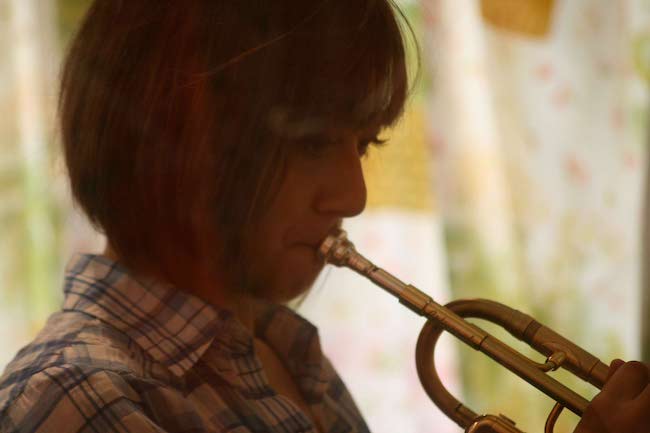
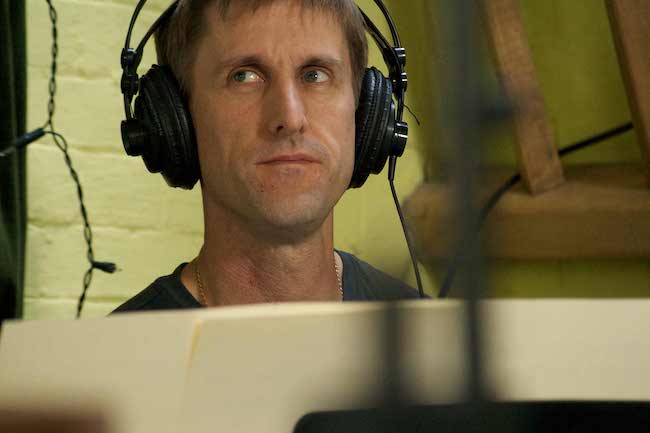
When you play with your Electric Dreams project, are those performances completely improvised?
Yes, and that’s quite scary actually. It’s hard work because you have to really concentrate, you’ve got to have this telepathic conversation with the other musicians. It’s one of those projects where you can’t do too many gigs because otherwise it would take away from the spontaneity of the performances. There’s a chance you could end up playing the same sorts of things again and again and then it doesn’t become improvised, spontaneous music anymore. I love playing in that band.
Do you step out onstage with a blank slate?
Basically. The last gig we did, I had an idea that Rod [Youngs], the drummer, and I start off doing something with a gentle feel but I just decided to go against that and did something really mad and wild, and people followed. When we were first getting to know each other onstage, we staggered the set, so it would start off as a duo, Jason Singh [a beatboxer] and I, and then we’d add Samuel [Hällkvist, guitarist], and then Rod, so it really built dynamically.
The last few gigs we’ve done, we’ve just let it happen, let whatever wanted to come out, come out. It’s always fun and because they’re really fantastic musicians, improvisers, and composers they’re very imaginative We don’t seem to get stuck anywhere where it becomes a bit dull.
I do remember something very funny, the last gig we did, Rod has a drum machine and it fell off the stage and set itself off. It was playing a rhythm and we were improvising and playing along, and this rhythm kept going on and nobody knew who it was. This piece lasted twenty minutes until we all decided to just stop, this silly rhythm was still going. We found out what it was after twenty minutes, but it was a beautiful piece in the end.
Have you been able to perform any of your music in Bahrain?
I have twice. The first time I played my suite inspired by traditional Bahraini music. We played that in 2016. That was the first time my dad had ever heard me play, so it was quite a special occasion—I was very nervous. Then I went to play with my quintet in 2019. The EFG bank, who sponsor London Jazz Festival, put on an event with ambassadors and all sorts of important people. They invited me and my band to play, which was very lovely.
How did you feel to be back in Bahrain?
It was wonderful. I felt really happy but also a little bit nervous because I wanted to represent Bahrain, I wanted to make them proud of me and they were. I got to speak to the Minister of Culture, she said, "Thank you so much for performing, representing Bahrain all over the world, we’re really proud of you." That was really nice feedback. The two times I’ve played there have been quite special and I hope to return again in the future.
About the author: David West is a London-based writer who has covered everything from East Asian cinema to MMA, and from jazz to death metal. His work has appeared in Rhythm, Jazz Journal, Prog, Metal Hammer, and many more. He’s the author of Chasing Dragons: An Introduction To The Martial Arts Film.
